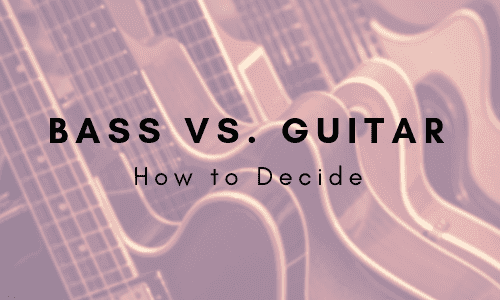
For aspiring musicians trying to decide between bass vs guitar, there are many factors to consider. What style of music do you want to play? What do you find most enthralling about that style? And, where do you see yourself fitting into that style?
These are all key questions to answer when considering which instrument to learn. Here, we’ll uncover the pros and cons of playing each instrument.
One important thing to realize is that whichever instrument you start with, you’ll learn concepts that apply to other instruments as well. This is all part of your musical journey and will help you become a multi-faceted musician.
[cta_split_test id=”BST-Guitar-Shortcode”]
To help you find the better fit for you, let’s start by breaking down the differences between the bass player and the guitar player.
Already made up your mind? Cast your vote on the best instrument to learn below!
Bass vs Guitar: How to Decide
Bass Guitar
The bass guitar is the foundation for all music. Without bass, there is nothing to weigh the music down and bring it all together. Oftentimes, the bass player is the most essential element in creating a successful band. They determine the “feel” of the music by laying down a pattern of notes according to their rhythmic pattern with the drums.
Bass players are often understated individuals who appreciate the improvisational nature of their instrument. While other instruments have to stick with their respective written parts, the bass player has a greater ability to play what they feel is right (especially in blues and jazz progressions).
For this reason, the bass player usually learns to be fluent with scales and chordal patterns so they can lay down an awesome bass line! When considering bass, you must ask yourself: is this the role I want to play?
Are you the “understated foundation” of the band? If you feel like this is the right place for you, then the next thing you should do is consider the style of music you want to play.
A Note About 4, 5, or 6 String Basses

A bass player has a unique choice in the number of strings they want on their bass guitar. You can purchase basses with 4, 5, or even 6 strings. For the most part, the only real difference between basses with more strings is the availability of higher or lower notes on the instrument.
Most 4-string basses are tuned like a guitar, that is: E-A-D-G. With 5 or 6 string basses you can choose to add lower notes, like B-E-A-D-G, or higher notes. While a 5 or 6 string bass can seem enticing, a majority of the time all you will need is 4 strings.
Pros of Bass:
- Bass is arguably the most important instrument in a band. A song without bass just isn’t right.
- Bass allows you to improvise and be active in the creation of a song.
- You can choose between a wide variety of bass guitars including 4, 5, or 6 string basses.
- Tabs for bass guitar are readily available.
Cons of Bass:
- Since the strings on a bass are bigger to provide the right tone, bass players have to work to get really strong fingers.
Guitar

The guitar is a very flexible instrument. A talented guitarist can fulfill several roles including rhythm section, lead guitar, or a mix of both! But generally, if you like to be the center of attention, the guitar is a good fit for you.
Guitarists play a defining role in the style of a band. If you listen to artists like Stevie Ray Vaughan and Kirk Hammett (from Metallica), and then compare them to Tommy Emmanuel, you’ll see just how much flexibility there is with this instrument.
Guitar players are often at the forefront of the band. While the bass provides the foundation of the music, the guitar player builds upon it. By building chord progressions from bass licks and matching them with a drum beat, the guitarist can create some awesome songs!
Pros of Guitar:
- While bass does have more freedom within a song, if there is a solo it usually goes to the lead guitar player.
- The strings on a guitar are smaller than on a bass, so there is less finger strength required to learn the guitar.
- There are numerous styles of guitar. You can play like Tommy Emmanuel or Kirk Hammett – the possibilities are endless!
- Tabs for music are readily available.
Cons of Guitar:
- The guitar is just as much a rhythmic instrument as a lead instrument, so it requires you to learn more chord shapes than bass.
- There is never a shortage of guitar players, so getting a gig can be difficult.
Musical Styles for Bass vs Guitar

What style of music do you hope to learn to play? What do you listen to in the car? Do you listen to rock, country, blues, jazz, or classical?
Both the guitar and bass have unique responsibilities within each genre of music. Neither guitar nor bass is any better than the other for a certain style of music; they simply perform different tasks.
For example, blues music offers improvisational freedom for both the bass and guitar. The bass player gets to make unique bass lines and the guitarist gets to play solos.
Where Do You Fit In?
If you’re still trying to decide between bass vs guitar, try taking a few introductory lessons. There are many guitar and bass teachers online and locally. Taking beginner level classes or lessons will give you a taste of each instrument so you can make a more informed decision.
 Post Author: Donnie E. Donnie teaches acoustic, electric, and bass guitar online, as well as locally in Nixa, MO. He has a Bachelor’s from Liberty University and has been teaching since 2015. Donnie enjoys rock, jazz, blues guitar, and more. Learn more about Donnie here!
Post Author: Donnie E. Donnie teaches acoustic, electric, and bass guitar online, as well as locally in Nixa, MO. He has a Bachelor’s from Liberty University and has been teaching since 2015. Donnie enjoys rock, jazz, blues guitar, and more. Learn more about Donnie here!Jessica Dais
